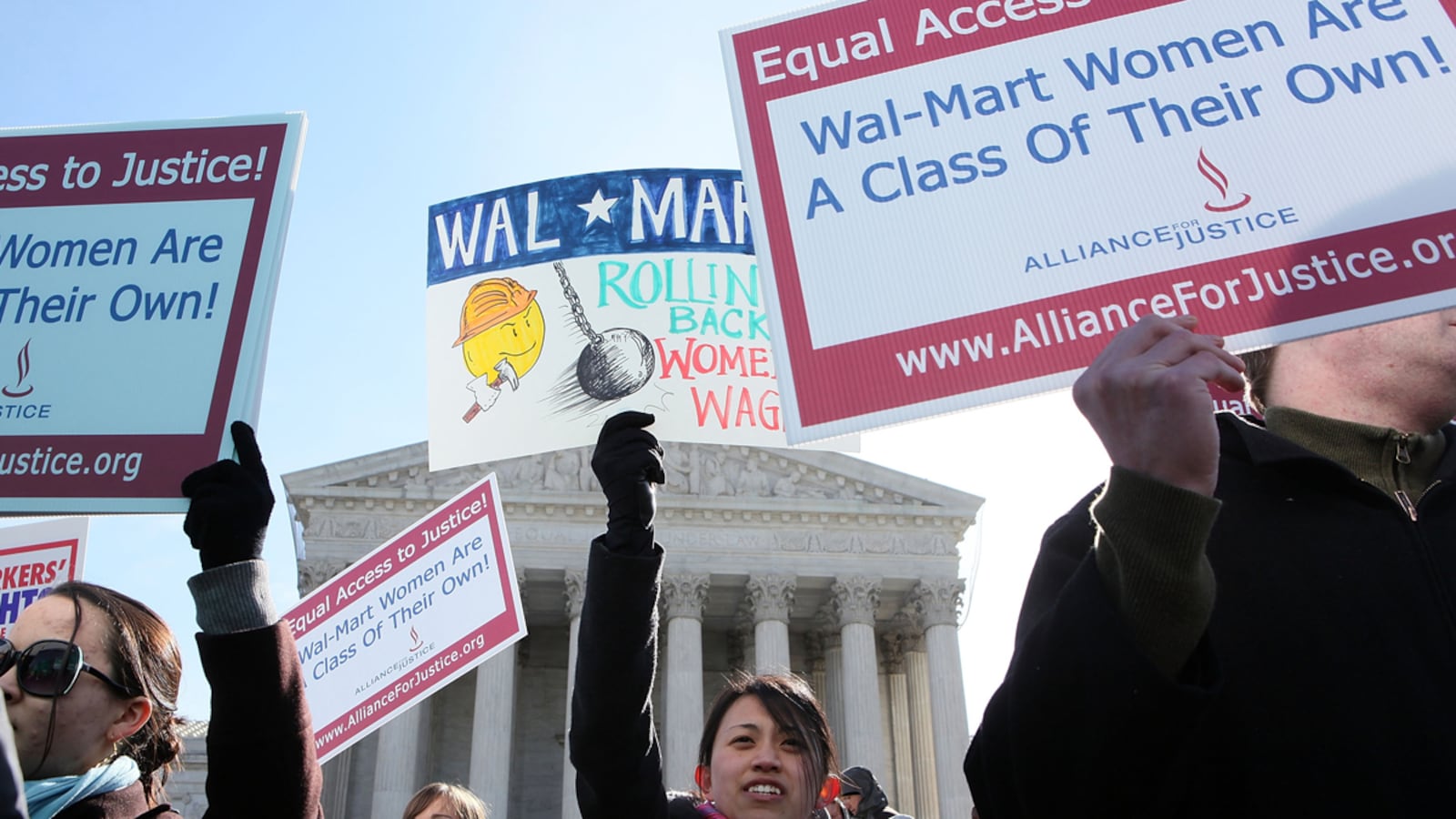The women of Walmart described an appalling corporate culture. Nationwide, women comprised 70 percent of the retail giant’s hourly workers, but only 33 percent of managers. Women were paid less in every region—despite having better performance reviews, more seniority, and fewer disciplinary problems than men. Local managers were given wide discretion to make decisions about pay and promotions, with few checks and balances from headquarters. And their bias was vividly outlined in many case documents. Well-paid work is a “man’s job,” one manager described. “You should raise a family and stay in the kitchen,” said another.
In 2001, the women of Walmart—led by Betty Dukes—decided to fight back, suing the chain on behalf of more than 1 million women, who’d been employed since 1998. Represented by a committed legal team, the women relied on established legal precedents and brought the case as a nationwide class action. They followed in the footsteps of many who’d faced discrimination before them—challenging a broad range of companies. And for a decade, they fought against Walmart’s attempts to stop the case from going forward in the courts—determined to secure gender parity not just for themselves, but for all the women who would come after.
Yet on Monday, the Supreme Court, in a 5-4 decision, dealt these women—and working women all around the country—a devastating blow. By accepting Walmart’s argument that the case could not proceed on behalf of all the women, but instead on behalf of only a limited number, it restricted the ability of all those fighting discrimination to seek justice using class actions in the future.
In the majority opinion, written by Justice Antonin Scalia, five justices created a series of new hurdles—as well as new incentives for employers to evade their responsibility to maintain a fair and equal workplace. The three women of the court, along with Justice Stephen Breyer, dissented. “Managers, like all humankind, may be prey to biases of which they are unaware,” wrote Justice Ruth Bader Ginsburg. “The risk of discrimination is heightened when those managers are predominantly of one sex, and are steeped in a corporate culture that perpetuates gender stereotypes.”
Going up against a company like Walmart—or even one a fraction of its size—has never been easy. Such an effort requires immense courage and resources, which is precisely why class actions are crucial. They allow large groups of people to band together to challenge systemwide discrimination, and they help workers surmount significant barriers—such as sheer expense and the fear of employer retaliation—that would discourage them from bringing an individual claim.

Class-action cases have made a huge difference. In 2001, for example, African-American employees joined in a nationwide class action to challenge pay and promotion inequities at Coca-Cola. A $100 million settlement was reached, and significant changes were made in the company’s policies and practices. And in a 2010 case, a jury awarded a nationwide class of female employees at the Novartis Pharmaceutical Company more than $250 million in damages for their claims that included discrimination in pay and promotions.
Justice Scalia said he was reassured that if a company has a non-discrimination policy on the books—or even if it doesn’t—most managers would select non-discriminatory criteria for pay and promotions. But the everyday experiences of literally millions tell us otherwise. It is especially troubling that after this decision, the larger the company the more likely it is to avoid legal responsibility for the discrimination of its managers by not monitoring or even setting standards for the managers’ decisions.
We know that the women of Walmart and their attorneys will keep fighting in this case to bring justice to as many as possible. But now, more than ever, Congress needs to step up, as it did after the Supreme Court issued another 5-4 decision devastating to women’s ability to secure equal pay, when it passed the Lilly Ledbetter Fair Pay Act. A good start would be to pass the Paycheck Fairness Act, which includes employer incentives to provide equal pay, and gives tools to employees, including through class actions, to secure it. In the current economy, there’s no time to waste.






